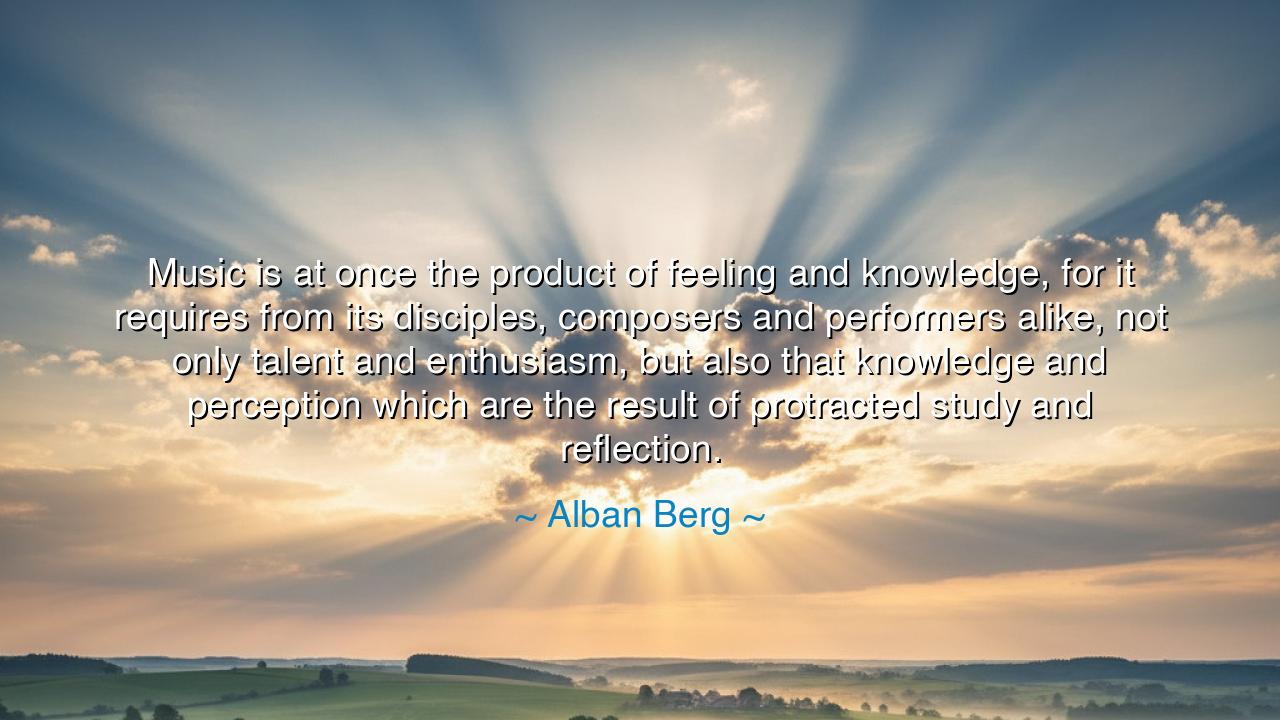
Music is at once the product of feeling and knowledge, for it
Music is at once the product of feeling and knowledge, for it requires from its disciples, composers and performers alike, not only talent and enthusiasm, but also that knowledge and perception which are the result of protracted study and reflection.






When Alban Berg proclaimed, “Music is at once the product of feeling and knowledge, for it requires from its disciples, composers and performers alike, not only talent and enthusiasm, but also that knowledge and perception which are the result of protracted study and reflection,” he spoke as both artist and philosopher. In this one statement lies the eternal union of emotion and intellect, the twin pillars upon which all great art stands. To Berg, music was not mere sound—it was the meeting of soul and science, of inspiration and discipline. The heart may give music its fire, but the mind must give it form.
The origin of this insight rests in Berg’s own life as one of the great composers of the early twentieth century—a student of Arnold Schoenberg, a pioneer of atonality, and a man who sought to reconcile deep emotional truth with the rigorous structure of modern composition. Living in a time when music was torn between tradition and innovation, Berg saw clearly that to create something lasting, one could not rely on passion alone. Emotion, though sacred, is fleeting; but knowledge and reflection give it shape and permanence. Thus, he taught that to make art worthy of eternity, the artist must unite feeling with understanding, instinct with craft, and inspiration with study.
In the language of the ancients, Berg’s teaching recalls the balance between Eros and Logos—the passion that moves the soul and the reason that guides it. Just as a flame without direction burns to ash, so too does feeling without discipline fade into chaos. And yet, knowledge without feeling is but a cold monument, lifeless and sterile. The wise artist, therefore, is one who masters both—the lover and the scholar, the dreamer and the craftsman. Music, in its highest form, becomes not merely entertainment but revelation—the voice of the human spirit tempered by wisdom.
Consider the story of Ludwig van Beethoven, who embodies Berg’s philosophy centuries before him. Deaf and tormented, Beethoven poured his entire being into his compositions, yet his genius was not born of emotion alone. Behind every symphony was a lifetime of study—counterpoint, harmony, the architecture of sound. His works were born in agony, sculpted through thought, and illuminated by passion. When he wrote his Ninth Symphony, he could no longer hear a single note, yet he understood music so profoundly that it lived in his mind beyond the reach of his ears. Thus, Beethoven stands as proof of Berg’s truth: that feeling gives birth to music, but knowledge sustains it.
Berg’s insight applies not only to music but to all human creation. In every art, every science, and every pursuit of excellence, mastery is achieved only when emotion and intellect walk hand in hand. The architect must feel beauty before he can measure it. The poet must know the weight of words before he can make them sing. Even in the acts of daily life, whether in leadership, teaching, or love, one must balance the warmth of heart with the clarity of mind. To live fully is to make one’s existence a symphony of discipline and inspiration.
In a deeper sense, Berg reminds us that art is a reflection of life itself. To live only by feeling is to be tossed by every wind of passion; to live only by reason is to walk in the shadow of the soul. But to live as the artist does—to reflect, to study, to feel, and to create—is to transform existence into meaning. This union of knowledge and emotion gives not only beauty to art but purpose to life.
So let this teaching endure: feeling alone is chaos; knowledge alone is emptiness. The wise artist, like the wise soul, learns to harmonize the two. Study not to stifle your passion, but to give it wings; feel deeply, but think profoundly. Whether you write a symphony or live a quiet life, let your deeds be both heartfelt and deliberate. For as Alban Berg teaches, it is only through the union of feeling and knowledge that the music of humanity rises above mere noise and becomes immortal harmony.






AAdministratorAdministrator
Welcome, honored guests. Please leave a comment, we will respond soon